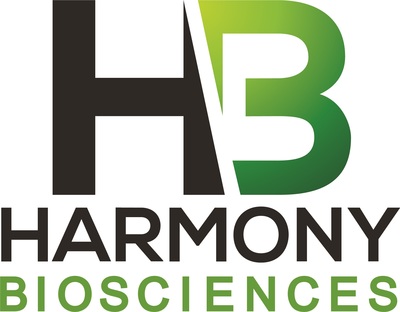HARMONY BIOSCIENCES ANNOUNCES TOPLINE DATA FROM PHASE 3 INTUNE STUDY EVALUATING PITOLISANT IN PATIENTS WITH IDIOPATHIC HYPERSOMNIA
Kumar Budur, M.D., Chief Medical Officer at Harmony Biosciences said, "We are very encouraged by the magnitude of the response seen in the initial open-label treatment period, where
The INTUNE study was a Phase 3 placebo-controlled, double-blind, randomized withdrawal study. Approximately
Dr. Budur added, "We are grateful to the patients, family members and clinicians who participated in the INTUNE study. We remain committed to the IH patient community and understand their strong desire for a non-scheduled treatment option for IH. Following a thorough review of the full data set, we will work closely with the FDA to discuss next steps and a path forward for pitolisant in IH."
Pitolisant is marketed as WAKIX® in the
Conference Call Today at 8:30 a.m. ET
We are hosting a conference call and webcast today at 8:30 a.m. Eastern Time to discuss the topline data from the Phase 3 INTUNE study. The live and replay webcast of the call will be available on the investor relations page of our website at https://ir.harmonybiosciences.com/. To participate in the live call by phone, dial (800) 245-3047 (domestic) or +1 (203) 518-9765 (international), and reference passcode HRMY1013.
About the INTUNE Study
The INTUNE study is a placebo-controlled, double-blind, randomized withdrawal Phase 3 registrational trial conducted in adult patients with IH at 52 clinical trial sites across the
About Idiopathic Hypersomnia
Idiopathic Hypersomnia (IH) is a rare and chronic neurological disease that is characterized by excessive daytime sleepiness (EDS) despite sufficient or even long sleep time. People living with IH experience significant EDS along with the symptoms of sleep inertia (prolonged difficulty waking up from sleep) and 'brain fog' (impaired cognition, attention, and alertness). The cause of IH is unknown, but it is likely due to alterations in areas of the brain that stabilize states of sleep and wakefulness. IH is one of the central disorders of hypersomnolence and, like narcolepsy, is a debilitating sleep disorder that can result in significant disruption in daily functioning. Approximately 80,000 people in the U.S. are believed to be affected by IH, with 40,000 currently having been diagnosed. IH is a condition with high unmet medical need.
About WAKIX® (pitolisant) Tablets
WAKIX, a first-in-class medication, is approved by the
Indications and Usage
WAKIX is indicated for the treatment of excessive daytime sleepiness or cataplexy in adult patients with narcolepsy.
Important Safety Information
Contraindications
WAKIX is contraindicated in patients with known hypersensitivity to pitolisant or any component of the formulation. Anaphylaxis has been reported. WAKIX is also contraindicated in patients with severe hepatic impairment.
Warnings and Precautions
WAKIX prolongs the QT interval; avoid use of WAKIX in patients with known QT prolongation or in combination with other drugs known to prolong the QT interval. Avoid use in patients with a history of cardiac arrhythmias, as well as other circumstances that may increase the risk of the occurrence of torsade de pointes or sudden death, including symptomatic bradycardia, hypokalemia or hypomagnesemia, and the presence of congenital prolongation of the QT interval.
The risk of QT prolongation may be greater in patients with hepatic or renal impairment due to higher concentrations of pitolisant; monitor these patients for increased QTc. Dosage modification is recommended in patients with moderate hepatic impairment and moderate or severe renal impairment (see full prescribing information). WAKIX is not recommended in patients with end-stage renal disease (ESRD).
Adverse Reactions
In the placebo-controlled clinical trials conducted in patients with narcolepsy with or without cataplexy, the most common adverse reactions (≥
Drug Interactions
Concomitant administration of WAKIX with strong CYP2D6 inhibitors increases pitolisant exposure by 2.2-fold. Reduce the dose of WAKIX by half.
Concomitant use of WAKIX with strong CYP3A4 inducers decreases exposure of pitolisant by
H1 receptor antagonists that cross the blood-brain barrier may reduce the effectiveness of WAKIX. Patients should avoid centrally acting H1 receptor antagonists.
WAKIX is a borderline/weak inducer of CYP3A4. Therefore, reduced effectiveness of sensitive CYP3A4 substrates may occur when used concomitantly with WAKIX. The effectiveness of hormonal contraceptives may be reduced when used with WAKIX and effectiveness may be reduced for 21 days after discontinuation of therapy.
Use in Specific Populations
WAKIX may reduce the effectiveness of hormonal contraceptives. Patients using hormonal contraception should be advised to use an alternative non-hormonal contraceptive method during treatment with WAKIX and for at least 21 days after discontinuing treatment.
There is a pregnancy exposure registry that monitors pregnancy outcomes in women who are exposed to WAKIX during pregnancy. Patients should be encouraged to enroll in the WAKIX pregnancy registry if they become pregnant. To enroll or obtain information from the registry, patients can call 1-800-833-7460. The safety and effectiveness of WAKIX have not been established in patients less than 18 years of age.
WAKIX is extensively metabolized by the liver. WAKIX is contraindicated in patients with severe hepatic impairment. Dosage adjustment is required in patients with moderate hepatic impairment.
WAKIX is not recommended in patients with end-stage renal disease. Dosage adjustment of WAKIX is recommended in patients with moderate or severe renal impairment.
Dosage reduction is recommended in patients known to be poor CYP2D6 metabolizers; these patients have higher concentrations of WAKIX than normal CYP2D6 metabolizers.
Please see the Full Prescribing Information for WAKIX for more information.
To report suspected adverse reactions, contact Harmony Biosciences at 1-800-833-7460 or the FDA at 1-800-FDA-1088 or www.fda.gov/medwatch.
About Harmony Biosciences
At Harmony Biosciences, we specialize in developing and delivering treatments for rare neurological diseases that others often overlook. We believe that where empathy and innovation meet, a better life can begin for people living with neurological diseases. Established by Paragon Biosciences, LLC, in 2017 and headquartered in
Forward Looking Statement
This press release contains forward-looking statements within the meaning of the Private Securities Litigation Reform Act of 1995. All statements contained in this press release that do not relate to matters of historical fact should be considered forward-looking statements, including statements regarding our product WAKIX. These statements are neither promises nor guarantees, but involve known and unknown risks, uncertainties and other important factors that may cause our actual results, performance or achievements to be materially different from any future results, performance or achievements expressed or implied by the forward-looking statements, including, but not limited to, the following: our commercialization efforts and strategy for WAKIX; the rate and degree of market acceptance and clinical utility of WAKIX, pitolisant in additional indications, if approved, and any other product candidates we may develop or acquire, if approved; our research and development plans, including our development activities with Bioprojet, and plans to explore the therapeutic potential of pitolisant in additional indications; our ongoing and planned clinical trials; the availability of favorable insurance coverage and reimbursement for WAKIX; the timing of and our ability to obtain regulatory approvals for pitolisant for other indications as well as any of our product candidates, including those we are developing with Bioprojet; our failure to achieve the potential benefits of the 2022 LCA with Bioprojet; our estimates regarding expenses, future revenue, capital requirements and needs for additional financing; our ability to identify additional products or product candidates with significant commercial potential that are consistent with our commercial objectives; our commercialization, marketing and manufacturing capabilities and strategy; significant competition in our industry; our intellectual property position; loss or retirement of key members of management; failure to successfully execute our growth strategy, including any delays in our planned future growth; our failure to maintain effective internal controls; the impact of government laws and regulations; volatility and fluctuations in the price of our common stock; the significant costs and required management time as a result of operating as a public company; the fact that the price of Harmony's common stock may be volatile and fluctuate substantially; statements related to our intended share repurchases and repurchase timeframe and the significant costs and required management time as a result of operating as a public company. These and other important factors discussed under the caption "Risk Factors" in our Annual Report on Form 10-K filed with the Securities and Exchange Commission (the "SEC") on February 21, 2023, and our other filings with the SEC could cause actual results to differ materially from those indicated by the forward-looking statements made in this press release. Any such forward-looking statements represent management's estimates as of the date of this press release. While we may elect to update such forward-looking statements at some point in the future, we disclaim any obligation to do so, even if subsequent events cause our views to change.
Harmony Biosciences Media Contact:
Cate McCanless
202-641-6086
cmccanless@harmonybiosciences.com
Harmony Biosciences Investor Contact:
Luis Sanay, CFA
445-235-8386
lsanay@harmonybiosciences.com
![]() View original content to download multimedia:https://www.prnewswire.com/news-releases/harmony-biosciences-announces-topline-data-from-phase-3-intune-study-evaluating-pitolisant-in-patients-with-idiopathic-hypersomnia-301955736.html
View original content to download multimedia:https://www.prnewswire.com/news-releases/harmony-biosciences-announces-topline-data-from-phase-3-intune-study-evaluating-pitolisant-in-patients-with-idiopathic-hypersomnia-301955736.html
SOURCE Harmony Biosciences








